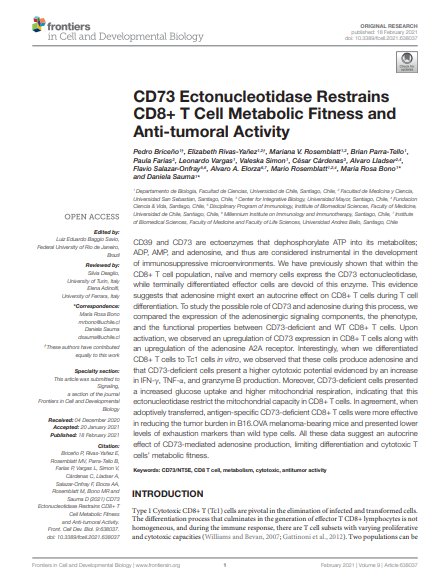CD73 Ectonucleotidase Restrains CD8+T Cell Metabolic Fitness and Anti-tumoral Activity 1 of 1 CD73 Ectonucleotidase Restrains CD8+T Cell Metabolic Fitness and Anti-tumoral Activity

Fecha
2021-02-18Autor
Briceño, Pedro
Rivas-Yañez, Elizabeth
Rosemblatt, Mariana V.
Parra-Tello, Brian
Vargas, Leonardo
Lladser, Alvaro
Salazar-Onfray, Flavio
Elorza, Alvaro A.
Rosemblatt, Mario
Bono, Maria Rosa
Sauma, Daniela
Farias, Paula; Cardenas, Cesar [Univ Mayor, Ctr Integrat Biol, Chile]
Ubicación geográfica
Notas
HERRAMIENTAS
Acceda a títulos restringidos
¿Cómo descargar?Resumen
CD39 and CD73 are ectoenzymes that dephosphorylate ATP into its metabolites; ADP, AMP, and adenosine, and thus are considered instrumental in the development of immunosuppressive microenvironments. We have previously shown that within the CD8+ T cell population, naive and memory cells express the CD73 ectonucleotidase, while terminally differentiated effector cells are devoid of this enzyme. This evidence suggests that adenosine might exert an autocrine effect on CD8+ T cells during T cell differentiation. To study the possible role of CD73 and adenosine during this process, we compared the expression of the adenosinergic signaling components, the phenotype, and the functional properties between CD73-deficient and WT CD8+ T cells. Upon activation, we observed an upregulation of CD73 expression in CD8+ T cells along with an upregulation of the adenosine A2A receptor. Interestingly, when we differentiated CD8+ T cells to Tc1 cells in vitro, we observed that these cells produce adenosine and that CD73-deficient cells present a higher cytotoxic potential evidenced by an increase in IFN-gamma, TNF-alpha, and granzyme B production. Moreover, CD73-deficient cells presented a increased glucose uptake and higher mitochondrial respiration, indicating that this ectonucleotidase restrict the mitochondrial capacity in CD8+ T cells. In agreement, when adoptively transferred, antigen-specific CD73-deficient CD8+ T cells were more effective in reducing the tumor burden in B16.OVA melanoma-bearing mice and presented lower levels of exhaustion markers than wild type cells. All these data suggest an autocrine effect of CD73-mediated adenosine production, limiting differentiation and cytotoxic T cells' metabolic fitness.
URI
https://repositorio.umayor.cl/xmlui/handle/sibum/9084https://www.ncbi.nlm.nih.gov/pmc/articles/PMC7930398/pdf/fcell-09-638037.pdf
https://doi.org/10.3389%2Ffcell.2021.638037
https://www.frontiersin.org/articles/10.3389/fcell.2021.638037/pdf?isPublishedV2=False
Coleccion/es a la/s que pertenece:
Si usted es autor(a) de este documento y NO desea que su publicación tenga acceso público en este repositorio, por favor complete el formulario aquí.